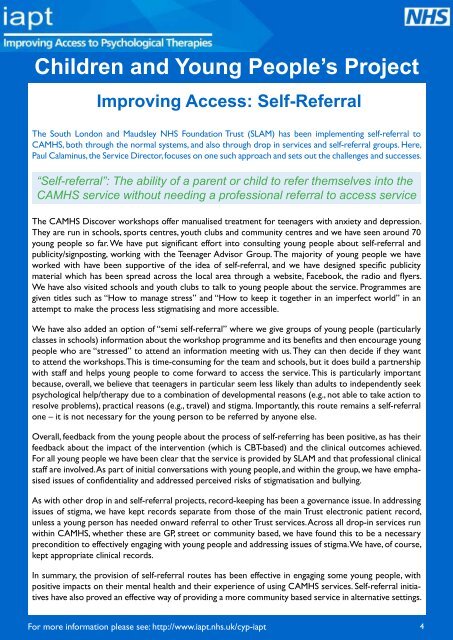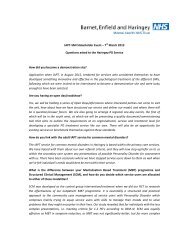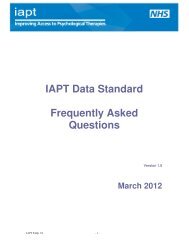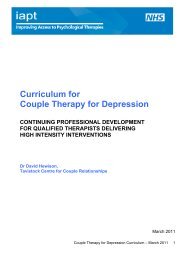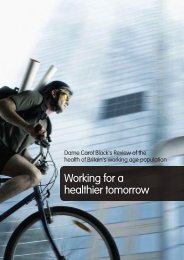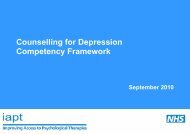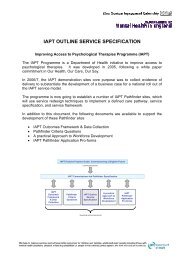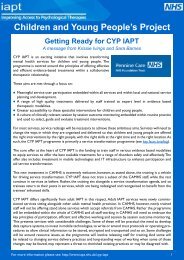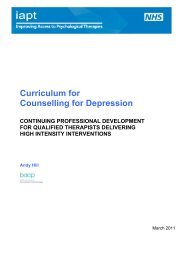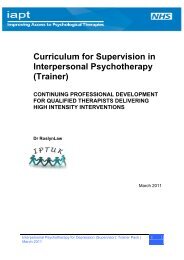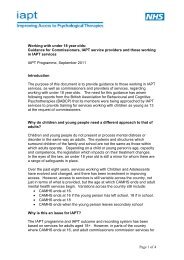December 2012 - IAPT
December 2012 - IAPT
December 2012 - IAPT
- No tags were found...
You also want an ePaper? Increase the reach of your titles
YUMPU automatically turns print PDFs into web optimized ePapers that Google loves.
Children and Young People’s ProjectImproving Access: Self-ReferralThe South London and Maudsley NHS Foundation Trust (SLAM) has been implementing self-referral toCAMHS, both through the normal systems, and also through drop in services and self-referral groups. Here,Paul Calaminus, the Service Director, focuses on one such approach and sets out the challenges and successes.“Self-referral”: The ability of a parent or child to refer themselves into theCAMHS service without needing a professional referral to access serviceThe CAMHS Discover workshops offer manualised treatment for teenagers with anxiety and depression.They are run in schools, sports centres, youth clubs and community centres and we have seen around 70young people so far. We have put significant effort into consulting young people about self-referral andpublicity/signposting, working with the Teenager Advisor Group. The majority of young people we haveworked with have been supportive of the idea of self-referral, and we have designed specific publicitymaterial which has been spread across the local area through a website, Facebook, the radio and flyers.We have also visited schools and youth clubs to talk to young people about the service. Programmes aregiven titles such as “How to manage stress” and “How to keep it together in an imperfect world” in anattempt to make the process less stigmatising and more accessible.We have also added an option of “semi self-referral” where we give groups of young people (particularlyclasses in schools) information about the workshop programme and its benefits and then encourage youngpeople who are “stressed” to attend an information meeting with us. They can then decide if they wantto attend the workshops. This is time-consuming for the team and schools, but it does build a partnershipwith staff and helps young people to come forward to access the service. This is particularly importantbecause, overall, we believe that teenagers in particular seem less likely than adults to independently seekpsychological help/therapy due to a combination of developmental reasons (e.g., not able to take action toresolve problems), practical reasons (e.g., travel) and stigma. Importantly, this route remains a self-referralone – it is not necessary for the young person to be referred by anyone else.Overall, feedback from the young people about the process of self-referring has been positive, as has theirfeedback about the impact of the intervention (which is CBT-based) and the clinical outcomes achieved.For all young people we have been clear that the service is provided by SLAM and that professional clinicalstaff are involved. As part of initial conversations with young people, and within the group, we have emphasisedissues of confidentiality and addressed perceived risks of stigmatisation and bullying.As with other drop in and self-referral projects, record-keeping has been a governance issue. In addressingissues of stigma, we have kept records separate from those of the main Trust electronic patient record,unless a young person has needed onward referral to other Trust services. Across all drop-in services runwithin CAMHS, whether these are GP, street or community based, we have found this to be a necessaryprecondition to effectively engaging with young people and addressing issues of stigma. We have, of course,kept appropriate clinical records.In summary, the provision of self-referral routes has been effective in engaging some young people, withpositive impacts on their mental health and their experience of using CAMHS services. Self-referral initiativeshave also proved an effective way of providing a more community based service in alternative settings.For more information please see: http://www.iapt.nhs.uk/cyp-iapt4


